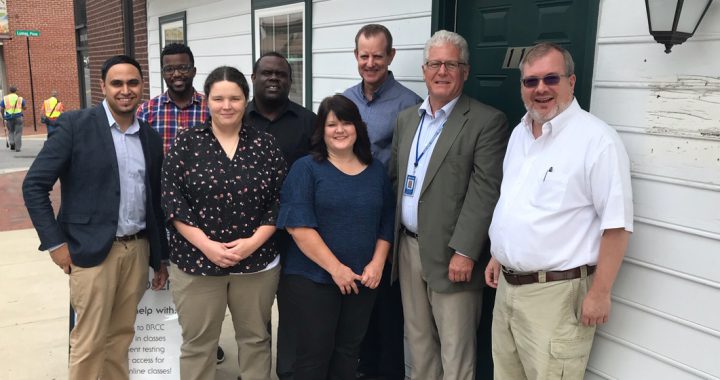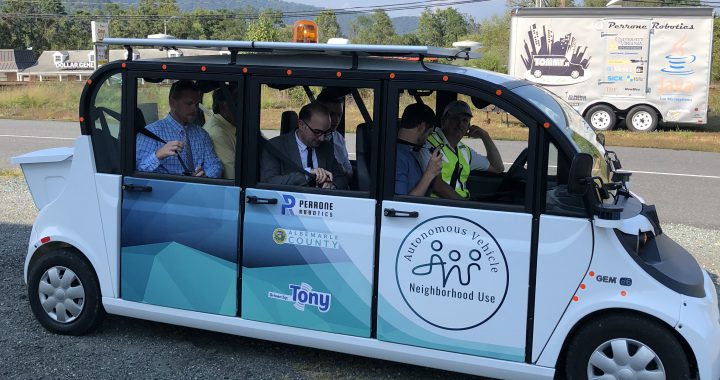News
Augusta County Supervisor Plants Fields of Gold
Posted on by host
Augusta County farmer, Gerald Garber, planted 150 acres of his land surrounding the Shenandoah Valley Regional Airport in sunflowers to welcome travelers to the beautiful Shenandoah Valley. The sunflowers attract thousands of butterflies and were planted along with other crop cover plants to help fertilize the land on his Cave View Farm in Weyers Cave. Mr. Garber is the chair of the Augusta County Board of Supervisors, chair of the Shenandoah Valley Airport Commission and an ardent supporter of agribusiness in the region.
GO Virginia BRCC Cyber Security Graduates
Posted on by host
Six graduates of Blue Ridge Community College’s GO Virginia cyber security training program have obtained positions with Tiber Creek Consulting, which is opening a new office in Waynesboro, VA, in the same building as BRCC’s Online Outpost. In addition, more students will participate in paid internships with Tiber Creek this fall. BRCC students will be performing cyber security assessments for federal contractors in Virginia as part of a $1.4 million Department of Defense grant awarded to GENEDGE Alliance.
The BRCC students received reduced-cost training from a GO Virginia grant awarded to BRCC in 2018. The goal of the grant is to train and employ 50 Tier I Cyber Security Analysts by July 2020, and to partner with local companies to offer in-demand, excellent-paying employment opportunities. The GO Virginia training program includes a security review course, CompTIA Security+ Exam, Cybrary online training, and on-the-job training, and takes approximately three months to complete.
Joint MPO Meeting Held
Posted on by host
The Staunton-Augusta-Waynesboro Metropolitan Planning Organization (SAWMPO) held its 5th annual Joint Policy Board Meeting with the Charlottesville-Albemarle MPO on Tuesday, October 1, 2019 in Crozet. Board members and agency staff heard presentations on inter-regional transit, the restoration of the Crozet Blue Ridge Tunnel, state-wide transit updates from the Department of Rail and Public Transportation, and toured the Perrone Robotics facility and lab to learn more about the local company’s autonomous vehicle research and development.
SAWMPO and CA-MPO meet annually and share their planning processes under a Memorandum of Agreement for collaborative and inter-regional planning signed in September, 2017.
Afton Express Study Continues
Posted on by host
The Virginia Department of Rail and Public Transportation (DRPT) is advancing the planning for the Afton Express transit service proposed to connect Staunton, Augusta County, Waynesboro and Charlottesville. DRPT has contracted with Kimley-Horn to confirm the need and projected ridership for the service from the Feasibility Study completed in 2017, and to refine a service plan and budget, as well as developing performance metrics. A stakeholder group representing the CSPDC and TJPDC, local jurisdictions and the University of Virginia met on September 23 to hear from the consultant on the planning work completed thus far, and to discuss next steps, including a preliminary discussion related to funding. The consultant presented an update on the study at the Joint MPO meeting on October 1, and will meet again with the stakeholder group in mid-November.
CSPDC Submits Chesapeake WIP III Final Reports to DEQ
Posted on by host
Last Spring, additional funding was granted by the Virginia Department of Environmental Quality (DEQ) to the CSPDC and 14 other Bay PDCs to continue the Phase III Watershed Implementation Plan (WIP III) efforts. The CSPDC held their third stakeholder meeting in August, 2019 to continue to develop regional Best Management Practices (BMP) project ideas and share funding opportunities. The CSPDC’s final WIP III reports were submitted to DEQ on September 30.
To meet the 2025 Chesapeake Bay Total Maximum Daily Load requirements, the Office of the Virginia Secretary of Natural Resources, through DEQ, released the Virginia’s Final Phase III Watershed Implementation Plan in August. The new PDC WIP III Implementation Assistance program with DEQ is anticipated to begin this Fall.
Announcements
Please stay tuned for events and more information from the CSPDC.
Archives
- February 2025
- January 2025
- December 2024
- October 2024
- September 2024
- August 2024
- July 2024
- June 2024
- May 2024
- April 2024
- March 2024
- February 2024
- January 2024
- November 2023
- October 2023
- September 2023
- August 2023
- July 2023
- June 2023
- May 2023
- April 2023
- March 2023
- February 2023
- January 2023
- December 2022
- October 2022
- September 2022
- August 2022
- July 2022
- June 2022
- May 2022
- April 2022
- March 2022
- February 2022
- January 2022
- December 2021
- November 2021
- October 2021
- August 2021
- July 2021
- June 2021
- May 2021
- April 2021
- March 2021
- February 2021
- January 2021
- December 2020
- November 2020
- October 2020
- September 2020
- July 2020
- June 2020
- May 2020
- April 2020
- March 2020
- February 2020
- January 2020
- November 2019
- October 2019
- September 2019
- June 2019
- May 2019
- April 2019
- March 2019
- February 2019
- January 2019
- December 2018
- October 2018
- September 2018
- August 2018
- July 2018
- June 2018
- May 2018
- April 2018
- March 2018
- February 2018
- January 2018
- December 2017
- November 2017
- October 2017
- September 2017
- August 2017
- July 2017
- June 2017
- May 2017
- April 2017
- March 2017
- February 2017
- January 2017
- December 2016
- September 2016




